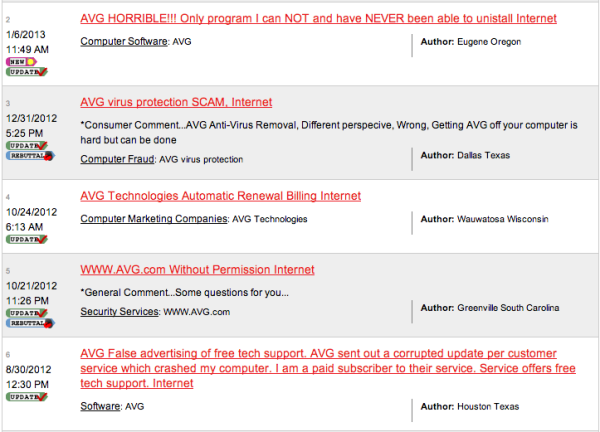Will A Google Crackdown On Shady Search Toolbars Hurt AVG & IAC?
Search toolbars are big business for security software company AVG and media company IAC. But could revenue from these toolbars be in danger, as Google says it is stepping up enforcement of its policies against shady behavior related to toolbar downloads? IAC’s Mindspark makes substantial revenues through search toolbars, and AVG, in September 2011, said […]
Search toolbars are big business for security software company AVG and media company IAC. But could revenue from these toolbars be in danger, as Google says it is stepping up enforcement of its policies against shady behavior related to toolbar downloads?
IAC’s Mindspark makes substantial revenues through search toolbars, and AVG, in September 2011, said it had made about 20% of its revenues (or around $40 million) from Yahoo and Google combined that year to date. People install these toolbars for the promise of security or entertainment. Then, when they conduct searches, they get back organic results and ads that are powered on the backend by Google (and Yahoo, in the case of AVG). The toolbar vendor and the search company both share in the revenue off ad clicks. AVG just renewed its deal with Google in November 2012, and partnered with Yahoo in December. Meanwhile, IAC’s latest renewal with Google was in April of 2011, and the pact covers the two companies’ relationship until 2016.
Last September, Google announced that it had new “software principles” designed to fight a common complaint with search toolbars: that consumers are uncertain how they got installed on their computers in the first place, that they don’t like the often ad-heavy search results they generate or that it’s hard to get them removed.
Despite this, a recent post by privacy advocate Ben Edelman accuses Google partner IAC of preying on unsuspecting users. Such behavior, if true, doesn’t seem to mesh with Google’s standards. (This isn’t the first time IAC has been accused of getting away with violating Google policies.) Meanwhile, a post on Seeking Alpha by hedge fund manager Eiad Asbah highlights issues with AVG. That post also suggested that a new crackdown would happen, and postulated that the Yahoo relationship was meant to protect AVG if problems arose with Google.
We reached out to Google, which declined to comment on either company but which did suggest that greater enforcement, hinted at in the Seeking Alpha post, would be coming:
While we can’t comment on individual customers, we recently announced that we are updating our ads policies and stepping up enforcement in order to ensure that users have a safe, trustworthy experience online [….]This included reworking our AdWords policy governing Software Principles to ensure that users are given important information before downloading software on their computers and that the software is not harmful or hard-to-uninstall.We’ve now started to extend updated requirements to those AdSense partners who negotiate individual agreements with Google.
AVG recently signed search contracts with Google and Yahoo, and we are continuing to work closely with them as a strategic partner on numerous fronts. AVG wants to ensure that peoples’ online experiences are transparent and safe. While search makes up a portion of our business, we are first and foremost a security and privacy company and are very aligned with Google in their efforts to make the web a better and safer place.
Perion was asked to make the changes, which come into force Feb. 1, to guarantee “transparency,” [Perion CEO Josef] Mandelbaum said.
We’ve always had a policy. The policy has been that we want to make sure that whatever ads are presented in whatever way our traffic is routed to ads, it is done in the best interest of the user, and we began to notice that they were sites and pages where we had too many ads in a page, so it became more restrictive and updated our policies for better enforcement. And that has resulted in higher quality results for end users; it has reduced in some cases the monetization that some of our partners are seeing as a result of this enforcement and hence you are seeing the impact on the numbers.
We just announced this policy sometime early this quarter, in the past quarter that we just went through, so you are going to see the impact over the next few quarters. We’ve also implemented more stringent policies around downloadable apps, and that’s why I think both those effects are going to stay with us for the year, but we think in the long-term is the right answer for us, it’s the right answer for users and it’s right answer for advertisers, so we think it’s a good thing to do.

AVG’s logo and description for Secure Search
Many consumer advocates would likely applaud Google’s changes, given the amount of consumer confusion around downloading some toolbar apps, and how to uninstall them. Just doing some cursory searches, I found many instances of frustrated consumers complaining about their attempts to uninstall the AVG Safe Search toolbar.

Comments about AVG on Ripoff Report
Mindspark’s toolbars come in for a lot of criticism as well, with one computer service company accusing the IAC subsidiary of using the bible to trick Christians into downloading “malware.” This because one of Mindspark’s toolbars is called Daily Bible Guide. Others, as Edelman notes in his report, seem to be targeted specifically at kids, such as Guffins, which offers virtual pets.

How Mindspark advertises Guffins on Google
Just as search ad technology companies were forced to make a decision about changing their products or falling out of favor with Google and losing their AdWords API key, these toolbar makers would seem to be facing a turning point. Either they need to change their ways — and become much more transparent and easy to use — or they’ll apparently need to look elsewhere for ads.
Police officer image used by permission of Shutterstock.
Related stories


